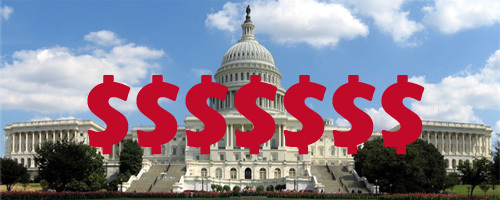
September 8, 2014 – Something that Washington does not want you to know about and hopes that nobody else will discuss during the minimum-wage debate is take-home pay after taxes for low-wage earners. Washington claims that Americans should be paid living wages so that they can live a decent life. However, it is not willing to give up its share of the booty that it would collect from the same low-wage earners it claims to help.
For example, the federal government will collect at least 15 percent of the increased income from those low-wage earners through payroll tax. In other words, if the minimum wage goes up by a dollar, the federal government will take away, directly or indirectly, at least 15 cents of that additional dollar from the working poor.
Asking large corporations, which are in business to make money, to pay additional wages is like asking them to be saints. Government mandates do not have a major impact on large corporations, since they will figure out a way around them. After all, they can rent lawmakers; one former senator famously declared, “My vote can’t be bought, but it can be rented.” On the other hand, politicians do not pay anything from their pockets either. They will just give the money to one group and take it from another, but not from the special-interest groups that finance their campaigns.
The small-business sector, on the other hand, has historically created two thirds of net new private jobs in the U.S. economy but cannot afford to rent lawmakers. Furthermore, they do not have the economies of scale as large businesses do, to be more efficient and productive. Therefore, businesses such as independently owned fast-food places, restaurants, dry cleaners, retail stores, etc., may not be able to afford a large increase in the minimum wage. Moreover, no employer wants to lose good and productive employees, especially the small businesses, and will pay whatever is needed to keep their employees happy, without government intervention and regulations.
So what should we do about it? First, we should change the narrative. It should be about how low-wage earners can take home more pay after taxes. The idea behind the minimum wage was to get a worker’s foot in the door and move up the ladder. However, the current narrative implies that low-wage workers are not capable of earning higher wages through their smarts and hard work. Second, what can we do so that low-wage earners can have opportunities to earn more money by gaining better skills and be empowered in the market place?
It really boils down to keeping Uncle Sam, or what I would call The Beltway Beast, out of our pockets under the illusion of helping the working poor. According to the Bureau of Labor Statistics (BLS), businesses incur about 30 percent of every dollar in employee wages on payroll taxes, insurance and other government mandates. This means 30 cents of every increased dollar in wages goes to Uncle Sam or related costs that would not directly benefit the workers. Wouldn’t it be better to get some of that money in the low-wage earner’s pocket instead of sending it to Washington in order to feed its bureaucracy?
We need a growing economy where there are more job openings than available workers. This way low-wage earners will be empowered to command higher pay to fill the labor shortage ensued by economic growth.
